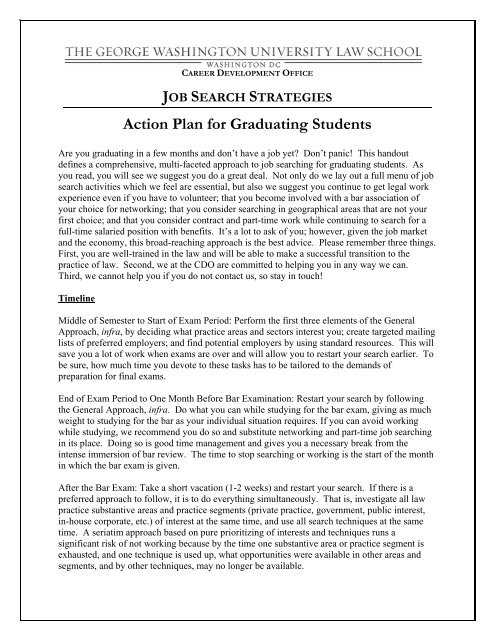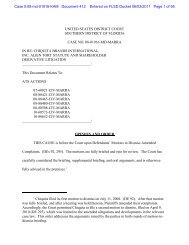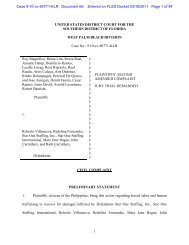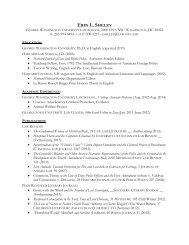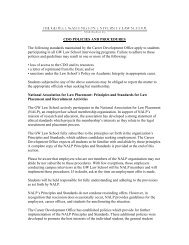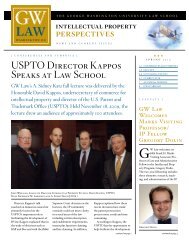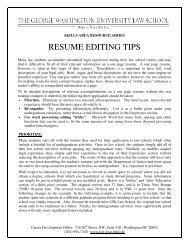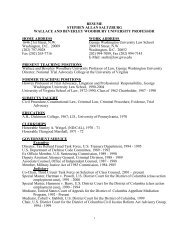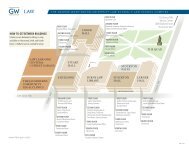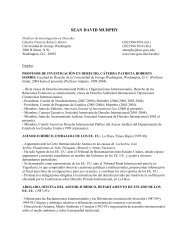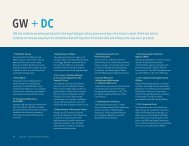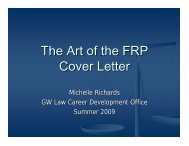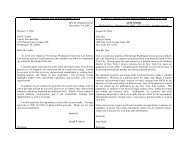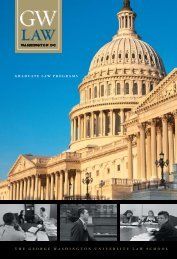Action Plan for Graduating Students - George Washington University ...
Action Plan for Graduating Students - George Washington University ...
Action Plan for Graduating Students - George Washington University ...
Create successful ePaper yourself
Turn your PDF publications into a flip-book with our unique Google optimized e-Paper software.
Are you graduating in a few months and don’t have a job yet? Don’t panic! This handoutdefines a comprehensive, multi-faceted approach to job searching <strong>for</strong> graduating students. Asyou read, you will see we suggest you do a great deal. Not only do we lay out a full menu of jobsearch activities which we feel are essential, but also we suggest you continue to get legal workexperience even if you have to volunteer; that you become involved with a bar association ofyour choice <strong>for</strong> networking; that you consider searching in geographical areas that are not yourfirst choice; and that you consider contract and part-time work while continuing to search <strong>for</strong> afull-time salaried position with benefits. It’s a lot to ask of you; however, given the job marketand the economy, this broad-reaching approach is the best advice. Please remember three things.First, you are well-trained in the law and will be able to make a successful transition to thepractice of law. Second, we at the CDO are committed to helping you in any way we can.Third, we cannot help you if you do not contact us, so stay in touch!TimelineCAREER DEVELOPMENT OFFICEJOB SEARCH STRATEGIES<strong>Action</strong> <strong>Plan</strong> <strong>for</strong> <strong>Graduating</strong> <strong>Students</strong>Middle of Semester to Start of Exam Period: Per<strong>for</strong>m the first three elements of the GeneralApproach, infra, by deciding what practice areas and sectors interest you; create targeted mailinglists of preferred employers; and find potential employers by using standard resources. This willsave you a lot of work when exams are over and will allow you to restart your search earlier. Tobe sure, how much time you devote to these tasks has to be tailored to the demands ofpreparation <strong>for</strong> final exams.End of Exam Period to One Month Be<strong>for</strong>e Bar Examination: Restart your search by followingthe General Approach, infra. Do what you can while studying <strong>for</strong> the bar exam, giving as muchweight to studying <strong>for</strong> the bar as your individual situation requires. If you can avoid workingwhile studying, we recommend you do so and substitute networking and part-time job searchingin its place. Doing so is good time management and gives you a necessary break from theintense immersion of bar review. The time to stop searching or working is the start of the monthin which the bar exam is given.After the Bar Exam: Take a short vacation (1-2 weeks) and restart your search. If there is apreferred approach to follow, it is to do everything simultaneously. That is, investigate all lawpractice substantive areas and practice segments (private practice, government, public interest,in-house corporate, etc.) of interest at the same time, and use all search techniques at the sametime. A seriatim approach based on pure prioritizing of interests and techniques runs asignificant risk of not working because by the time one substantive area or practice segment isexhausted, and one technique is used up, what opportunities were available in other areas andsegments, and by other techniques, may no longer be available.
General Approach1. Decide what practice areas and sectors of the practice interest you. Pay close attention to thecourses you took and the work experience you had. They, at least partially, will tend todefine where you will be more marketable. Remember to revise your resume to emphasizeyour relevant practice area experience <strong>for</strong> each application.2. Create targeted employer search lists by practice areas and sectors, and where you feel youwill be most competitive. This is time consuming, but it is imperative. Be candid whenassessing where you are most competitive, but do not underestimate yourself either.3. Use standard resources, Internet and print, to find employers. A preferred list of Internetresources is set <strong>for</strong>th below, and other print and Internet resources are discussed in the text ofvarious sections.4. Check Internet career resource websites regularly (at least once a week) <strong>for</strong> jobannouncements.5. Read the classified ads in relevant legal newspaper(s) every week. Copies of DC Metro areapapers are available in the CDO Resource Library; others are online. Graduates have foundfull-time jobs in tough markets by answering these ads.6. Write employers directly, especially close to the time your bar results are expected and,certainly, after you pass the bar. A surge in hiring usually occurs when bar results areknown, especially by small and mid-sized firms. Feel free to start earlier if you have a lot tocontact and then follow up when the results are public.7. Consider geographical locations other than your most favored, especially if you havecontacts there; your hometown can help you get started. An excellent way to get a handle onthe market in another location is to contact graduates of GW Law and your undergraduateinstitution on an in<strong>for</strong>mational basis (not as job interviews). The CDO can put you in touchwith members of our Alumni Career Advisor Network who have agreed to speak withstudents and alumni about their practice areas. You can also use www.martindale.com andLeadership Directories (accessible through the Portal) to find alumni.8. Even though finding a job is almost a job in itself, try to make some time to find some parttimework, paid or volunteer. Doing so allows you to continue to develop your professionalskills and, perhaps more importantly, shows potential employers that you consider yourself amember of the profession and you are committed to the practice. It also shows initiative byrefusing to remain professionally inactive.9. Become active in the substantive law section(s) of interest to you in state, county, ormunicipal bar associations. This is an excellent way to network, especially if you offer tohelp with CLE programming.10. If an employer cannot or will not offer full-time employment with the usual benefits,consider working on a contract basis and obtaining health insurance through a state, county,or local bar association, the ABA, or your undergraduate institution. Newspaper reportsindicate such institutions are now marketing such insurance to their alumni at competitiverates. The idea is do reasonable legal work while continuing to look <strong>for</strong> salaried work. Thesame rationale applies to part-time work. An old saying is that it is always easier to find ajob when you already have a job.11. If you are not able to secure paying legal work sufficient to allow you to meet livingexpenses and start paying student loans, consider petitioning your lenders to allow you to2
<strong>for</strong>bear starting repayment until you can secure such work. The maximum <strong>for</strong>bearanceperiod is usually two years, during which time accrued interest is added to principal(capitalized). It may also be possible <strong>for</strong> you to pay just the interest during the <strong>for</strong>bearanceperiod. You may need a letter from the CDO to the lender certifying that you areunemployed and you are actively seeking employment. We will provide that letter. If youfind yourself with volunteer legal work only, a time-honored solution is a part-time non-legaljob to defray ordinary living expenses.Specific Strategies by Practice SectorsDirect Contacting of Private Firms1. An easy way to build a targeted employer list in the private practice segment is to usewww.martindale.com and www.lawyers.com. The <strong>for</strong>mer tends to emphasize mid-sized tolarge law firms, while the latter emphasizes sole practitioners and small to mid-sized firms.These sites are free and registration is not required. Martindale.com can also be accessedthrough www.lexis.com; contact the CDO <strong>for</strong> the Lexis ID number. On the sign-in page,enter the Lexis ID number and leave the password section blank. There are other resourceson Lexis, including Judicial and Government resources, accessed by clicking on“Reference”, and then “Career Development”. Westlaw has a Careers tab also, with links toadvice on managing your career: www.lawchool.westlaw.com. If you access your Westlawpassword be<strong>for</strong>e graduation, it remains active <strong>for</strong> one year following graduation, allowingyou access to certain career-related databases and Attorney Jobs Online (through the Careerstab). After a year following graduation, the only way you can gain access to the website is tovisit the CDO in person and ask the staff to log onto the site using our staff password.2. Use martindale.com’s Lawyer Locator to find law firms and lawyers by areas of practice andgeographical location (city, county, state, country). Click on the Location/Area of Practicetab, enter the relevant in<strong>for</strong>mation, and click on “Search”. If you are searching <strong>for</strong> GW Lawalumni <strong>for</strong> in<strong>for</strong>mational interviewing, click “Advanced” and select “Lawyers”, then type“<strong>George</strong> <strong>Washington</strong> <strong>University</strong>” in the Law School window. If the substantive practice areais not contained in the scroll down list, highlight “All Areas” and type the area in the windowimmediately to the right. When searching <strong>for</strong> firms practicing particular kinds of law, scrollthrough the partner biographical section on the firm’s martindale.com website to find thepartner(s) who practice in your area(s) of interest. This will give you some idea of theproportion of the firm’s total practice represented by this area. If you decide the firm is oneto which you wish to apply, do not write the GW grad or any other partner in the samepractice area. Instead, write to either the hiring partner, by name (you may have to call thefirm to learn her or his name), or the recruiting director. If the firm’s martindale.com websitehas a link to its commercial website, or the address of that site, you can usually find the nameor contact in<strong>for</strong>mation there; look <strong>for</strong> links labeled “jobs”, “career”, “recruiting”. Or searchGoogle using the firm’s name. Smaller firms may not have any <strong>for</strong>mal recruiting staff, socall to find out to whom to write; it could be a senior partner or her/his assistant. No matterto whom you address the letter, draft it as if you were writing to the ultimate decision-maker.The risk of writing directly to a partner in your practice area is that the recruiting staff maybe miffed that you avoided them, and a GW alum may feel you are trying to use the fact thatyou both went to the same law school to gain an unwarranted advantage and not respond to3
you. When answering an announcement, always send your credentials to the person specifiedtherein, but, again, draft your correspondence as if you are writing the ultimate decisionmaker.3. Lawyers.com is similar to martindale.com with its Find A Lawyer Quick Search; the scrolldown practice area list is in two parts, one <strong>for</strong> “personal users” and one <strong>for</strong> “business users”.4. An excellent resource <strong>for</strong> DC Metro area law firms is the Legal Times Directory of MetroDC Law Offices which may be viewed in the CDO Resource Library.5. For finding public interest-oriented private law firms, use Harvard’s Private Public Interestand Plaintiff’s Firm Guide.Direct Contacting of Government Agencies1. Use Leadership Directories to find in<strong>for</strong>mation about government agencies and GW alumniin the government. This resource is available through a link on the Portal, under “LawSchool Resources.” This database provides extremely detailed in<strong>for</strong>mation aboutgovernment personnel, including direct dial phone numbers and email addresses.2. Another excellent Internet resource is the NALP Legal Employment Opportunities Guide,www.pslawnet.org/uploads/2008-2009_FLEOG_FINAL_PDF.pdf. It has a resourcebibliography, discussion of federal employment generally, application guidance (glossary ofterms; description of <strong>for</strong>ms; salary and benefits in<strong>for</strong>mation; tips on landing a job), plenty ofInternet addresses <strong>for</strong> agencies and their internal divisions and discussion of their missions,and individual agencies’/divisions’ hiring projects and contact in<strong>for</strong>mation.3. With the exception of the Department of Justice (DOJ), you should learn the name of theGeneral Counsel of the agency (or other title describing the chief legal officer). Generally,you will send your credentials directly to that person. You should specify the division(s) inwhich you are interested. Because government positions at this level do turn over, especiallywhen there is a change of administration, you might wish to call the General Counsel’s officeto confirm the name of the General Counsel be<strong>for</strong>e writing. Virtually all DOJ entry-levelhiring is done through the Attorney General Honors Program; seewww.usdoj.gov/oarm/arm/hp/hp.htm. DOJ lateral hiring is decentralized among the variousdivisions; so either write to the Assistant Attorney General <strong>for</strong> the division(s) in which youare interested, or to any individual or position specified on the division’s web page. Lateralpositions are usually posted at www.usdoj.gov/oarm. If other agencies’ legaldepartment/office of general counsel webpages or the NALP Federal Legal EmploymentGuide specify a designated individual or position to whom to send your credentials, followthose instructions.4. When answering a federal government job announcement, always write to the named contactperson. This person is usually in the agency’s human resource department that is collectingresumes <strong>for</strong> the Office of General Counsel or other legal entity in the agency. Theseannouncements can sometimes be found on the agency’s website and more frequently on thatof the Office of Personnel Management, www.usajobs.opm.gov. USAJOBS has a feature bywhich you can have new announcements sent to you weekly. All such announcementsusually specify that you submit a supplemental document that demonstrates you possess the“Knowledge, Skills, and Abilities” (KSAs) required by the position. There is a certain skillin preparing this document (It is not a re-write of your resume.) and you should consult theCDO’s detailed resources on this topic.4
5. Many other federal agencies hire through Honors Programs which have pre-set qualifications<strong>for</strong> applicants and may (as DOJ does) make distinctions between recent graduates andexperienced lawyers. For in<strong>for</strong>mation about all Honors Programs, consult the GovernmentHonors & Internship Handbook at www.law.arizona.edu/career/honorshandbook.cfm.Contact the CDO to get the current username and password. Caveat: The Handbook focuseson students, graduating 3Ls/4Ls, LLMs (who are eligible <strong>for</strong> Honors Programs only if theyare US citizens and entered their LLM program directly after receiving their JD), and currentjudicial law clerks. Even if the deadline has passed, do not hesitate to write directly to thegeneral counsel. Unexpected departures and workload increases do occur.6. Resources <strong>for</strong> state and municipal government agencies are found in Leadership Directories.Follow the same procedure <strong>for</strong> federal agencies when applying to state and municipalagencies. Most, if not all, State and Municipal governments have webpages. If you cannotfind them in any print resource, use the Google search engine to search <strong>for</strong> “[Name of State]State Government”. There may be links to municipal and county websites. A goodstate/county/city website to search <strong>for</strong> lawyers in state and municipal governments iswww.statelocalgov.net/index.cfm. A good site <strong>for</strong> state and local prosecutors iswww.prosecutor.info.Direct Contacting of Public Interest Entities1. The major print resource is Harvard Law School’s “Serving the Public: A Job Search Guide",which is available in the CDO Resource Library. It has a good overview with descriptions ofspecific practice areas. When writing directly to apply <strong>for</strong> a position with a public interestorganization, write to the head of its legal department or to the head of the entity if it is acompletely legal entity, such as a public defender service. Follow up as you would with aprivate law firm or government agency. When answering an announcement, always write tothe designated contact person.2. An excellent, indeed critical, on-line resource <strong>for</strong> public service (broadly defined)opportunities is the Public Service Law Network Worldwide, a/k/a PSLawNet,www.pslawnet.org. This database assists law students and graduates to locate public serviceopportunities with public interest organizations, government agencies, judges, and privatefirms with public interest or significant pro bono practices. Because GW subscribes to thisservice, it is free <strong>for</strong> GW students and alumni. To access PSLawNet, you need to spend afew minutes registering your profile so that you can receive a password and member ID. Asnoted in the instructions, it is even possible to request e-mail notification when certain typesof positions become available3. The National Legal Aid and Public Defender Association website (www.nlada.org) containsnational job listings <strong>for</strong> public defender and legal aid offices. Equal Justice Works(www.equaljusticeworks.org) has in<strong>for</strong>mation regarding post-graduate fellowships and moregeneral in<strong>for</strong>mation regarding loan <strong>for</strong>giveness programs, other career websites, etc.Direct Contacting of In-House Corporate Legal Departments1. The major print resources are the Directory of Corporate Counsel and the Martindale-Hubbell Corporate Law Directory, both of which are in the CDO Resource Library. OnlyMartindale-Hubbell is online as the “Corporate” tab on martindale.com’s Lawyer Locator.5
You have to know the name of the corporation and its geographical location. But, if youwant to know the names of the corporations which have told martindale.com they have inhouselegal departments in a given city or state, just type in the name of the city andhighlight the state, or just highlight the state; cities will be presented in alphabetical order.Click on the corporate name to see the department listing. These two print resources havebiographical in<strong>for</strong>mation on individual members of each department listed. As when writingthe General Counsel of a government agency, write to the head of the legal department whois usually the first person listed and, many times, has the title of Vice President and GeneralCounsel. When answering a specific job announcement, always write to the designatedcontact person.2. While most corporate legal departments hire experienced attorneys, usually those with 6-8years experience (and usually not more than 10), there are exceptions and you can only findout by contacting them directly. For example, some interviewed during FRP.CDO Online Job Search ResourcesThe CDO has compiled links to online job search resources including job banks, search engines,and directories; government, judicial clerkship, and public interest-related links; and links tostate bar and other professional groups’ in<strong>for</strong>mation.www.law.gwu.edu/Careers/onlineresources/Pages/LegalJobSearchLinks.aspxPlease note: This is not a comprehensive list of all the legal resources available online. The listis periodically updated; if you encounter a non-working link, please email the CDO atcdo@law.gwu.edu.6


